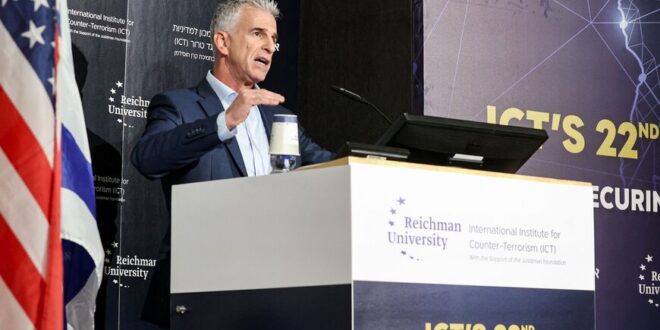Mossad chief David Barnea warned the Iranian leadership directly and Moscow more subtly, but his real message was for American ears.
Mossad chief David Barnea threatened Iran on Sunday, stating that the leadership in Tehran could find itself in the crosshairs. His words reflected Israel’s growing concerns about Tehran’s potential acts of terror in the region and especially in the West Bank.
Barnea’s speech at the annual conference of Reichman University’s International Institute for Counter-Terrorism in Herzliya was unusual, to say the least. He threatened the Iranian government personally, and also made veiled threats against the Russians and harshly criticized the Biden administration.
“Terror has become a cheap and common weapon in the hands of the Terroristic Republic of Iran,” Barnea said, using a title he has been invoking lately.
Barnea revealed that 27 terror plots across the globe were foiled over the past year by Israel and its allies, saying, “Fortunately for Iran, their terror efforts have been thwarted. Why fortunately for them? Because thus far we have only gotten to the operatives and those who dispatched them.”
Barnea noted that despite the Mossad’s past policy of targeting attackers themselves, now, any attempt by Iran to harm Jews or Israelis “will lead to activity against the Iranians who sent the terrorists and also against the decision-makers, from the ground operators to the commanders who approved the operation to the highest echelon, and I mean that.”
He added, “The Iranian regime no longer has room for denial and above all, it has no immunity. Our message is sharp, clear and resolved to those who decided to launch the squads: Be sure that we will reach you.”
Previaling frustration within Israel
Haim Tomer is the former head of the Mossad’s counterterrorism division. “Barnea’s words mirror prevailing frustration within Israel’s security system,” he told Al-Monitor. “Barnea actually threatened the Iranians that if they continue directing, launching or instigating terrorist activities against Israel or against Israeli interests, they will suffer retaliation in the heart of Tehran.”
Asked why Barnea chose to issue such a blatant public threat, Tomer said, “In the past we used to speak weakly and act strongly. From my acquaintance with Barnea, he would not have resorted to such language without full coordination with Prime Minister [Benjamin] Netanyahu. One thing is certain, there is a clear increase in Iranian efforts to harm Israel. The head of the Mossad also spoke about the means of sabotage and explosives that Iran is pushing into the West Bank. Israel will not sit quietly and tolerate such developments.”
Still, Tomer feels that the speech was first and foremost meant for American ears.
“Barnea sees the behind-the-scenes contacts between Iran and the US and it frustrates him. He sees how countries in the region are getting closer to Iran, how an agreement with the American administration is taking shape, how the world ignores the fact that Iran is a terrorist state in every sense of the term,” Tomer said.
Barnea’s threats, though unusual in their overtness, are actually in line with the strategic policy change championed by former Prime Minister Naftali Bennett. Shortly after taking office in June 2021, Bennett decided that Israel will act not only against terror operators, but also against Iran itself, on its soil, whenever it uses proxies against Israel. Bennett’s new policy, dubbed “the Octopus Doctrine,” seeks to expose and retaliate not only against the arms but also against the head.
Strategic shift
Though Israel never took responsibility, the doctrine could explain the May 2022 killing of IRGC commander Hassan Sayyad Khodaei, the February 2023 drone attack on the Isfahan military base.
Barnea also addressed Moscow. Barnea was less blunt, but nevertheless clear. A recent attempt by Iran to provide Russia with missiles amid its war on Ukraine were foiled, said Barnea, adding, “I have a feeling that more deals will be foiled soon.”
“Barnea made it clear that Israel does not seek a confrontation with the Kremlin, but will not hesitate to act against anything that it perceives as endangering its security, and this includes procurement transactions of this type,” a senior Israeli security official told Al-Monitor on condition of anonymity.
“In this context,” the source added, “there is a sensitive and precise balance between Israel and Russia, in which Israel does not supply Ukraine with weapons, while the Russians do not supply all that Iran is striving to procure, despite their situation on the battlefield.”
That being said, Barnea’s message to Moscow was simple: If Russia crosses Israel’s red line on Iran, Israel will not hesitate to return the favor.
 Eurasia Press & News
Eurasia Press & News



